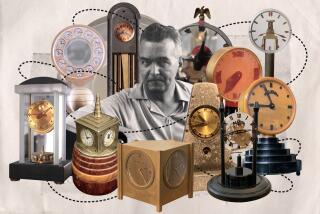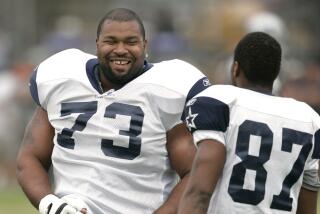In Triumph and Tragedy, Allisons Race On
- Share via
RICHMOND — By agreement with her husband, Davey, Liz Allison is overseeing all details of the 8,400-square-foot mansion they’re building in Hueytown, Ala., with the profits of his booming stock car racing career.
“I don’t have any problems with Davey. When I’m happy, he’s happy,” said Liz, a slender, cheerful woman from Charleston, S.C. “The only problem I’m having right now is with my builder.”
That’s because the builder, like many red-blooded Southern males, is a fervid fan of Davey, the rising star of the Winston Cup stock car circuit, and has his own vision of what an Allison home should look like.
The builder’s dream house features huge mirrors in the entryway with checkered flags etched in the glass and a big “A” carved in the middle, plus ceiling-high trophy cases on either side of the foyer. “I told him,” said Liz, “‘I’m very proud of Davey and his accomplishments, but this is my home. I have to live here.” Davey, 31, chuckled sheepishly at the dilemma and shrugged. He’ll just have to build a room in a separate garage complex for the trophies, he said, where passing fans can pay homage without disrupting the flow of life for Liz and their two kids. And yes, the checkered-flag mirrors are out.
“I feel the same as she does,” said Allison. “I don’t want our house to be a mausoleum.”
The last word hung eerily in the autumn air, as ominous as the screech of brakes outside a busy schoolyard. Surely he meant “museum.” A mausoleum is a tomb. The slip seemed particularly portentous because death or its specter have visited the Allisons this year not once, not twice, but over and over again. “It’s been our best and worst year, all combined,” said the mustachioed young racer, who despite a run of bad luck still stands second in driver rankings three-fourths of the way through the NASCAR season, his highest standing ever.
“I guess when I look back on 1992 five years from now, I’ll look back on the good things,” he said. “Of course, my grandfather and my brother passed away, but the good things are going to stand out.”
Race car drivers are not supposed to ponder death. They’re in the business of defying it. “I don’t drive conservative,” says Allison flatly. Yet a pall of peril is out there for him, dirty smoke on the horizon that’s hard to ignore. On May 16 at Charlotte, he raced Kyle Petty door-to-door to the finish of The Winston, rubbing sheet metal and galvanized rubber at 170 m.p.h. Allison won by half a car-length, but as they crossed the line the cars slammed together and Allison’s Thunderbird spun and hurtled straight into a retaining wall, hitting driver’s side-on at full speed, the worst kind of crash in racing. Allison was knocked loopy and had to be cut free of the car.
“That one could have killed him,” said press aide Brian VanDercook. “Davey just sat there unconscious with his chin on his chest while the fans went wild. It was very scary.” But it was a pale precursor of worse to come. On July 19 at Pocono, Allison took the pole with the fastest qualifying car, then led 115 of 149 laps and seemed destined for a trip down victory lane before tangling with Darrell Waltrip as they jockeyed for position near a turn called “the tunnel.”
They touched and Allison’s car hurtled toward the guard rail, flew half over it and began spinning diabolically atop it. It flipped 11 times before coming to rest in the grass beyond, a tangled, smoking heap of ruined metal.
The violent crash was on the same track near the same spot where a dreadful collision ended the driving career of Allison’s father, Bobby, four years earlier, almost claiming his life.
Car owner Robert Yates was in the Pocono garage area when Davey spun out. “I thought that was it,” he said. Driver Mark Martin “came over to me and said, ‘I don’t think Davey made it.’ ”
But luck smiled on Allison again. He was unconscious, with a broken collarbone, dislocated wrist and two broken bones in his arm, but alive. He was even well enough to get in the race car the following weekend to make an official start at Talladega, though he quickly turned the driving over to relief man Bobby Hillin Jr., who brought it home third. But neither crash, nor any of the three less serious crackups he’s endured in car No. 28 in this, his most crash-riddled season, prepared Allison for the cruelest blow, which came Aug. 13. He was en route to Michigan to race in the Champion 400 when younger brother Clifford slammed his Busch Grand National car into the wall during practice and the Allison luck finally ran out.
Bobby Allison, who was helping Clifford, 27, start a late-blooming racing career, was in the garage when it happened. He saw an ambulance speed down pit road the wrong way and knew it was a bad sign. He walked onto the track, ignoring officials’ warnings to keep back. “I said, ‘That’s my son. I can handle it.’ ” Twenty feet from the car, Bobby Allison looked through the windshield and saw Clifford slumped over the wheel. “I could see his helmet, his suit, but it was already obvious he wasn’t moving. I walked to the front of the car where I could look in, and then I was really sure he was dead.”
Davey Allison arrived that evening. The next day he drove hard past the spot where his only brother had died of severe head trauma. Two days later he raced to fifth place, earning $29,265.
In burying his grief that way, Allison followed a tradition of a proud racing family. Bobby Allison drove past his brother Donnie’s career-ending crash at Charlotte in 1981 and went on to win. Davey himself slowed to look, then went on racing at Pocono in 1988 when his father nearly lost his life.
It’s a strange and danger-strewn path these men follow, rich with rewards, but played out at a ferocious pace on the razor’s edge.
Before Davey Allison could walk, he wanted to race. “I remember the first two words out of his mouth when he was nine months old,” said his father, the third-winningest racer ever on the NASCAR circuit, now tied with Waltrip at 84 wins. “Davey stood up on the car seat next to me and said, ‘VRADDNNN! VRADDNNN!’ “--the sound a bored, stroked, unmuffled NASCAR V8 makes when you hit the throttle.
“Davey always looked at the race track with admiration,” said Bobby, who put his son to work early sweeping floors and sorting nuts and bolts. Bobby now heads the Raybestos racing team that competes directly with Davey’s Havoline team, as well as with the Country Time team for which Donnie is chassis specialist.
The Allison name has been synonymous with stock car racing since the 1950s, when Bobby broke in, but young Clifford had turned a blind eye to its attractions until recently. He left home at 17, married a girl 15 and came back two years later with a child and no wife. Clifford set up a car repair shop in the basement of a double-wide trailer, eventually got remarried to a divorcee with two kids of her own and finally entered racing last year with aid from Bobby, who helped him get a car.
Then, the crash.
After the funeral, Bobby Allison sat with Clifford’s widow, Elisa, at her home. “She told me, ‘I just feel like taking a sledgehammer and going outside and smashing that race car,’ ” Bobby recalled. “I said, ‘Don’t do it.’ Then I got the Birmingham newspaper and showed her the obituaries. There were 10 traffic fatalities, one boating fatality, one drowning and a worker killed at a shop. I told her, ‘These people were just like Clifford. They’re not going to come back and their families are grieving just as bad. But stopping racing does nothing. It’s just part of what goes on out there.’ ”
More to Read
Go beyond the scoreboard
Get the latest on L.A.'s teams in the daily Sports Report newsletter.
You may occasionally receive promotional content from the Los Angeles Times.










